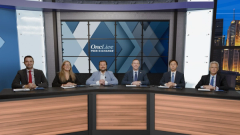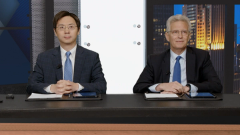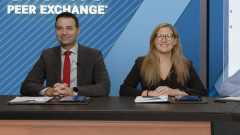
Diffuse Large B-Cell Lymphoma: Unmet Needs and Future Directions in Care
Closing out their discussion on the management of relapsed/refractory diffuse large B-cell lymphoma, expert panelists highlight unmet needs and share excitement for future evolutions in the treatment landscape.
Episodes in this series

Transcript:
Matthew A. Lunning, DO, FACP: Before we close, I’d like to get some of your thoughts. Each of you is going to get an opportunity. [Give us] some unmet medical needs in large cell lymphoma and a clinical pearl that’s come about in your practice in the last 1 to 2 years as we’ve seen an explosion in DLBCL [diffuse large B-cell lymphoma].
Hayder M. Saeed, MD: There’s still patients, post–CAR [chimeric antigen receptor] T-cell therapy, who relapse. For those patients, we still don’t have a good answer to their treatment. Unfortunately, they tend to relapse aggressively, and in a way that’s hard to control their disease. If we can focus on this group of patients, we’re doing great things with CAR T cells, bispecifics, and targeted therapies. But this is group of patients that we’re missing. We need to see the outcome, getting close to what we’ve seen with other cancers such as Hodgkin lymphoma. We’re getting there, but post–CAR T-cell relapse is a difficult patient population, and we need to improve on their outcomes.
Matthew A. Lunning, DO, FACP: Dr Rhodes?
Joanna M. Rhodes, MD, MSCE: One theme recently is the disparities that exist within all cancer treatment, but in lymphoma specifically as well. There are a ton of abstracts starting to look at this. Once we start to identify the disparities, we’ll do a better job of fixing them. One thing that came up that was not a large cell lymphoma was in Dr [Alex] Herrera’s plenary [session], when we saw that if we all work together and if we think about it, we can improve clinical trial accruals in underrepresented populations. That’s something that will be exciting to see how we do as a group in the future.
Matthew A. Lunning, DO, FACP: When we all play nicely together in the sandbox, we go through studies really fast.
Joanna M. Rhodes, MD, MSCE: Really, really fast.
Matthew A. Lunning, DO, FACP: Yes. Dr Westin?
Jason Westin, MD, MS, FACP: I agree. Access to care is a huge issue, and I’m glad to see it getting a lot of attention. Hopefully we’ll improve our representation on our trials. I agree that 1 of the biggest needs is the relapsed/refractory space. The challenge in the next few years with all these new drugs is [to determine] which drug for which patient. It would be wonderful if we had biomarkers, if we had the ability to figure this out in a scientific fashion as opposed to, “This patient is older. This patient isn’t as fit.” Some biologic rationale would be wonderful to have. I’m also enthusiastic about ctDNA [circulating tumor DNA]. The MRD [minimal residual disease] assessments, with some of the technologies that have ultrasensitive detection, have potential to revolutionize early detection of relapse or escalation or de-escalation of therapy. A clinical practice pearl is that as soon as that patient looks to be relapsing in the second line, send them to the CAR T-cell center.
Matthew A. Lunning, DO, FACP: Dr Wang?
Yucai Wang, MD, PhD: In the relapsed setting, I may need to get the therapy to the patient. We know CAR T cells and antibody drug conjugates work, but there are logistical challenges of getting these things to patients. That remains an unmet need. We need to catch patients who are eligible from a disease and patient standpoint. But from a logistics standpoint, there are challenges. In the front line, we’ve been combining all kinds of agents that are active in the lab setting with R-CHOP [rituximab, cyclophosphamide, hydroxydaunorubicin hydrochloride, vincristine, prednisone] or the polatuzumab vedotin–R-CHP [rituximab, cyclophosphamide, hydroxydaunorubicin hydrochloride, prednisone] backbone. As we study and understand more about the disease biology, there remains a need to finding the correct X in combination with the standard chemotherapy moving forward.
In terms of a pearl, when it comes to CAR T and bridging, there are more data showing that it’s feasible to do CAR T infusion even if you have a CR [complete remission] bridging therapy. Sometimes that makes me a little worried. It’s not just a CR without disease on the scan. When you do a TBNK [T cells, B cells, natural killer cells] profiling, there are B-cell aplasia as well. In those situations, you’re sending T cells without tumor cells reacting with them, without even the normal B cells at the back reacting with them. In low-burden disease, where patients aren’t having explosive progression, maybe skip the bridging therapy.
Matthew A. Lunning, DO, FACP: Bring us home, Dr Flinn.
Ian W. Flinn, MD, PhD: As the last in line, my issue has already been commented on. I’ll build on the notion that we’ve seen an explosion of therapies that have been approved in the third and second lines. It’s not necessarily how to sequence them, but it’s the notion that you don’t necessarily get another chance. It’s not as if you can use each 1 after the next. That’s disappointing. We have to realize that while we have a bunch of options, we’re not going to be able to use all those. We’re trying to develop strategies and combine some of these things.
Matthew A. Lunning, DO, FACP: What’s your pearl?
Ian W. Flinn, MD, PhD: My pearl is the same thing Jason said: call the cell phone of your cellular therapist once you suspect a relapse early.
Matthew A. Lunning, DO, FACP: Perfect. Thank you to our panelists for this rich and informative discussion. And to our viewing audience, thank you for joining us. We hope you found this OncLive® Peer Exchange® to be useful and valuable to the treatment of your patients with diffuse large B-cell lymphoma. Have a great day.
Transcript edited for clarity.










































